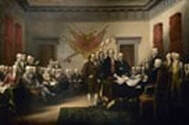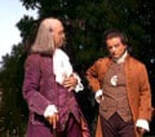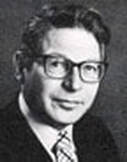Sherman Edwards was born on 4 April 1919. Wow, just barely over 100 years ago. In college, he majored in history. While he was in college, he got extra money by playing jazz on the piano at various venues. After serving his country in the military during WWII, he taught high school history, still playing the piano at night. After a bit, he realized that he was making more money playing the piano than he was teaching history. He went on to play with some of the greats of swing: Louis Armstrong, Benny Goodman, and Tommy Dorsey.
Eventually, he found himself writing songs in the Brill Building in New York City (what remained of Tin Pan Alley), churning out hits by the numbers. Among his pop hits are the nauseating “See You in September.” But he also wrote a few for Elvis. The problem with writing for Elvis was that you were forced to take a sizeable pay-cut in order for the King to record your song.
One day, we are told, Edwards stood up mid-song, announced that he was leaving to write a Broadway musical, left the Brill building, and never looked back.
I don’t have the exact date for this. So, we don’t know how long he struggled with his musical, trying to get the music and the lyrics just right, trying to get backers, producers and all the rest. While Edwards wrote the music and the lyrics, the book—or the spoken parts—were rewritten by Peter Stone, a well-respected screen- and playwriter.

Sorry. He didn’t.
But a lot of that was because of the necessity of paring down the Congress of 50 people to something more manageable on stage. He played with the timeline and the characters quite a bit. For example: John Adams in the play is a combination of John and his cousin Sam. Also, at the time of the signing of the Declaration, John was well-liked. It wasn’t until while he was President that people found him to be obnoxious. (A running gag has to do with Adams “being obnoxious and disliked, you know it’s true.”) However, there are some wonderful bits that are direct quotes from the historical people. In particular, the letters that are sung between John and Abigail Adams contain quotes from letters the two wrote each other. They get a little steamy by 18thcentury standards.
1776 opened on Broadway on 16 March 1969 and closed after 1217 performances. It won a Tony award for best musical. It even garnered the attention of then-President Nixon. He liked the musical, but didn’t like one song: “Cool, Cool, Considerate Men.” He felt that song put the conservatives in government in a bad light, and because he was buddies with Jack Warner, the head of Warner Brothers, that song was cut from the movie version. (If you watch the DVD, it has been returned.)

The musical has the honor of having the longest stretch without music of any musical out there: a 30- minute stretch in Act 1, Scene 3. But there is so much that is going on, you don’t even notice. It is the only time that Broadway musicians are allowed to leave the orchestra pit during performances.
I would like to tell you about the wonderful things that Sherman Edwards did after writing 1776. I would like to, but I can’t. He died on 30 March 1981 at the age of 61. I’m sure that he did things, but none of them seem to have been of any note.

I’ll be playing songs from the musical all week on my Minnich Music Facebook page, so please be sure to check them out. And if you have a favorite song from the musical or for this time of year, please let me know in the comments below. I’d love to hear from you!
Until next time!

 RSS Feed
RSS Feed